Analysis of Legal and Ethical Principles in Healthcare: A Case Study
VerifiedAdded on 2023/01/12
|10
|2805
|1
Report
AI Summary
This report analyzes a case study concerning legal and ethical principles in healthcare, focusing on the care of a prisoner named Doreen. It examines ethical decision-making, including values affecting Doreen and Bea, and the consistency of decisions with ethical articles. The report also explores legal obligations, such as obtaining consent and the authority of the Prison Governor. It addresses processes for ensuring decision-making capacity, the reliability of advance health directives, and factors substitute decision-makers must consider. The analysis highlights the importance of patient autonomy, informed consent, and the ethical responsibilities of healthcare professionals in complex situations, particularly when dealing with vulnerable populations and end-of-life decisions. The case underscores the need for careful consideration of patient wishes, legal mandates, and ethical guidelines to ensure appropriate and compassionate care.
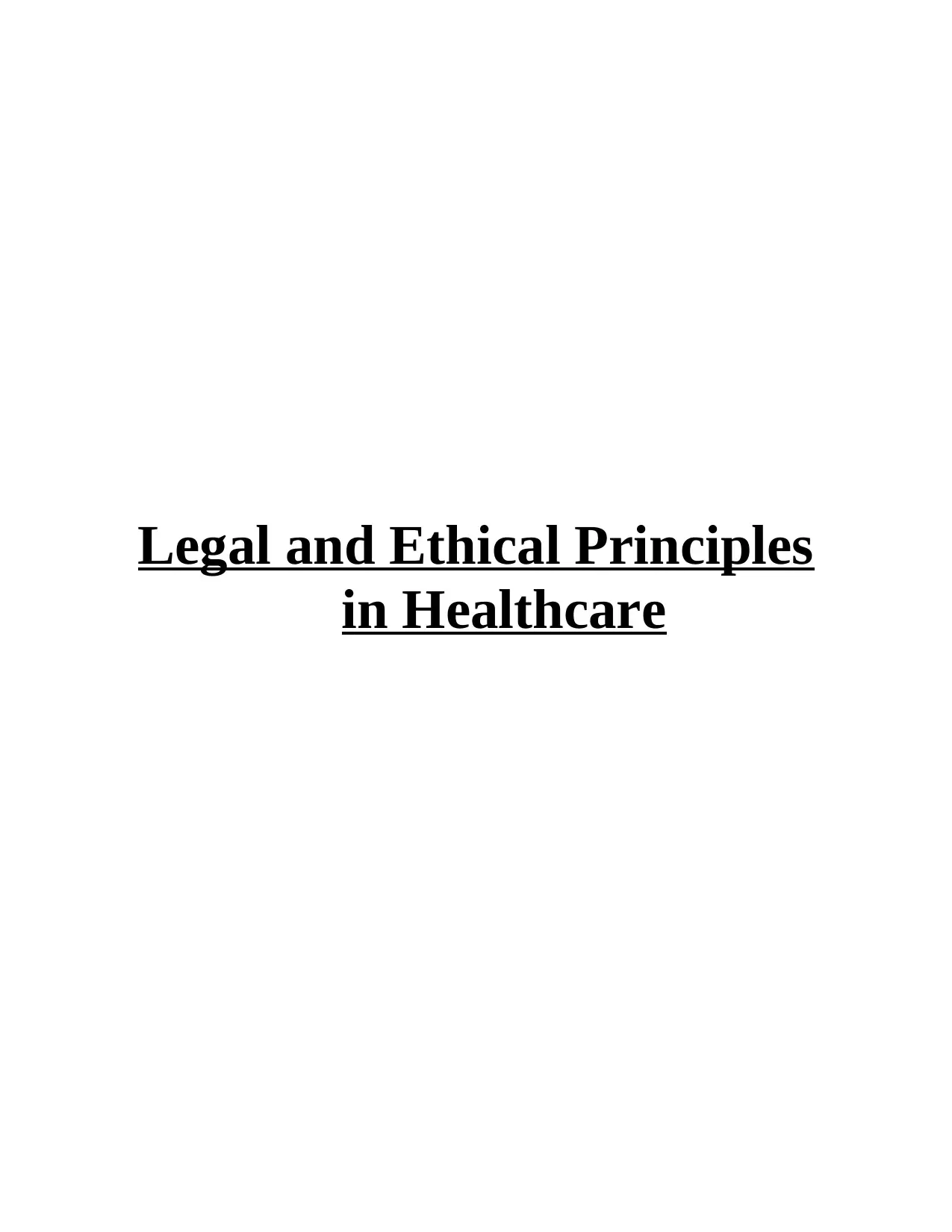
Legal and Ethical Principles
in Healthcare
in Healthcare
Paraphrase This Document
Need a fresh take? Get an instant paraphrase of this document with our AI Paraphraser
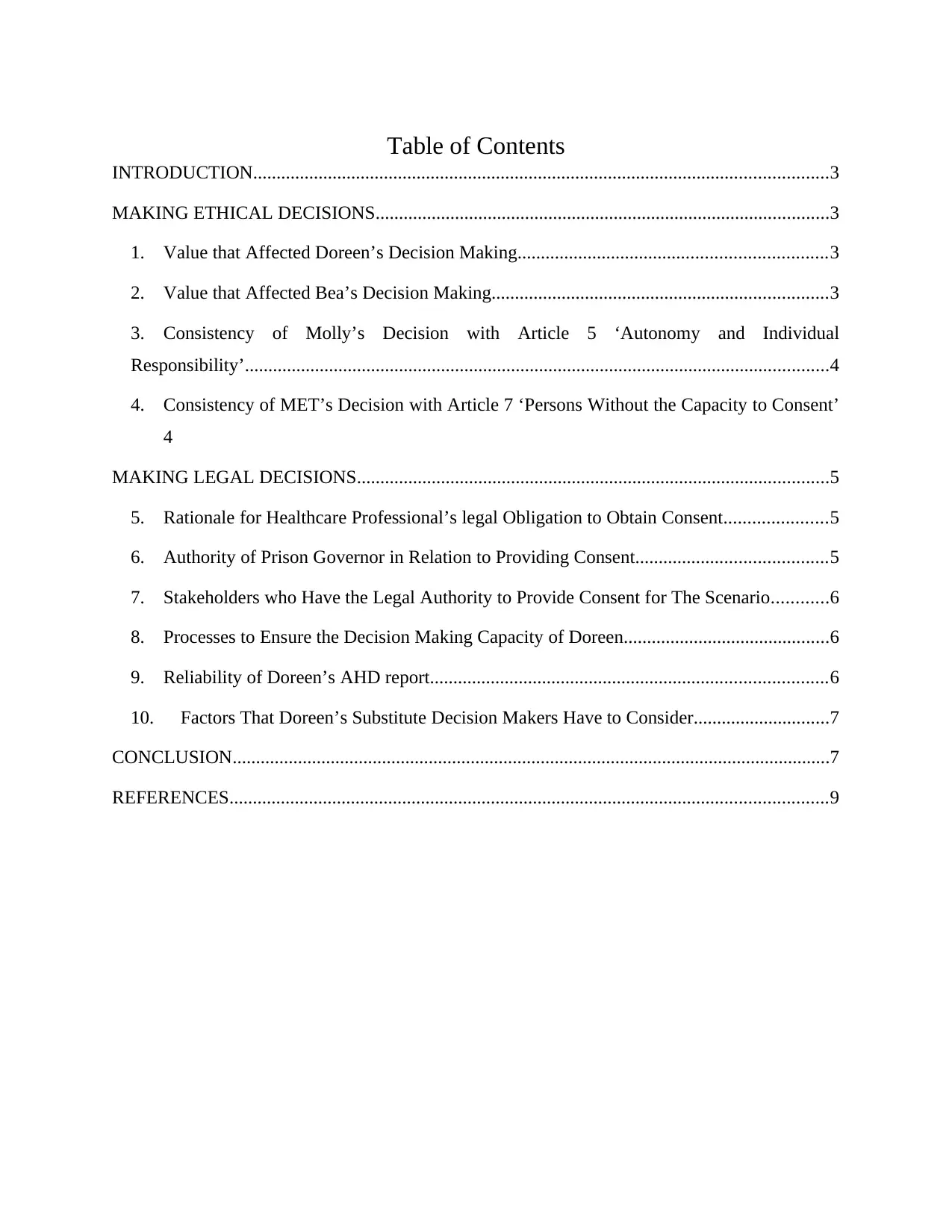
Table of Contents
INTRODUCTION...........................................................................................................................3
MAKING ETHICAL DECISIONS.................................................................................................3
1. Value that Affected Doreen’s Decision Making..................................................................3
2. Value that Affected Bea’s Decision Making........................................................................3
3. Consistency of Molly’s Decision with Article 5 ‘Autonomy and Individual
Responsibility’.............................................................................................................................4
4. Consistency of MET’s Decision with Article 7 ‘Persons Without the Capacity to Consent’
4
MAKING LEGAL DECISIONS.....................................................................................................5
5. Rationale for Healthcare Professional’s legal Obligation to Obtain Consent......................5
6. Authority of Prison Governor in Relation to Providing Consent.........................................5
7. Stakeholders who Have the Legal Authority to Provide Consent for The Scenario............6
8. Processes to Ensure the Decision Making Capacity of Doreen............................................6
9. Reliability of Doreen’s AHD report.....................................................................................6
10. Factors That Doreen’s Substitute Decision Makers Have to Consider.............................7
CONCLUSION................................................................................................................................7
REFERENCES................................................................................................................................9
INTRODUCTION...........................................................................................................................3
MAKING ETHICAL DECISIONS.................................................................................................3
1. Value that Affected Doreen’s Decision Making..................................................................3
2. Value that Affected Bea’s Decision Making........................................................................3
3. Consistency of Molly’s Decision with Article 5 ‘Autonomy and Individual
Responsibility’.............................................................................................................................4
4. Consistency of MET’s Decision with Article 7 ‘Persons Without the Capacity to Consent’
4
MAKING LEGAL DECISIONS.....................................................................................................5
5. Rationale for Healthcare Professional’s legal Obligation to Obtain Consent......................5
6. Authority of Prison Governor in Relation to Providing Consent.........................................5
7. Stakeholders who Have the Legal Authority to Provide Consent for The Scenario............6
8. Processes to Ensure the Decision Making Capacity of Doreen............................................6
9. Reliability of Doreen’s AHD report.....................................................................................6
10. Factors That Doreen’s Substitute Decision Makers Have to Consider.............................7
CONCLUSION................................................................................................................................7
REFERENCES................................................................................................................................9
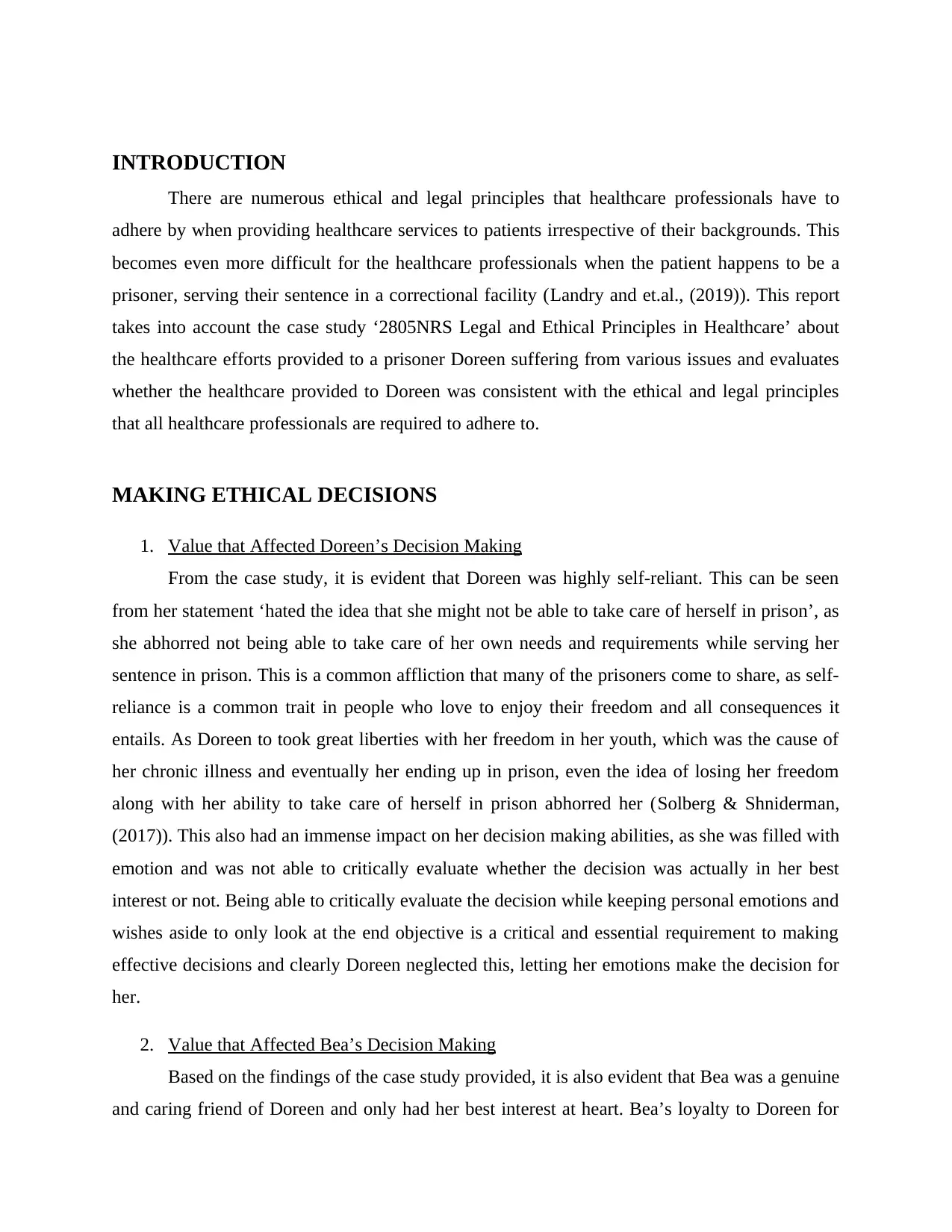
INTRODUCTION
There are numerous ethical and legal principles that healthcare professionals have to
adhere by when providing healthcare services to patients irrespective of their backgrounds. This
becomes even more difficult for the healthcare professionals when the patient happens to be a
prisoner, serving their sentence in a correctional facility (Landry and et.al., (2019)). This report
takes into account the case study ‘2805NRS Legal and Ethical Principles in Healthcare’ about
the healthcare efforts provided to a prisoner Doreen suffering from various issues and evaluates
whether the healthcare provided to Doreen was consistent with the ethical and legal principles
that all healthcare professionals are required to adhere to.
MAKING ETHICAL DECISIONS
1. Value that Affected Doreen’s Decision Making
From the case study, it is evident that Doreen was highly self-reliant. This can be seen
from her statement ‘hated the idea that she might not be able to take care of herself in prison’, as
she abhorred not being able to take care of her own needs and requirements while serving her
sentence in prison. This is a common affliction that many of the prisoners come to share, as self-
reliance is a common trait in people who love to enjoy their freedom and all consequences it
entails. As Doreen to took great liberties with her freedom in her youth, which was the cause of
her chronic illness and eventually her ending up in prison, even the idea of losing her freedom
along with her ability to take care of herself in prison abhorred her (Solberg & Shniderman,
(2017)). This also had an immense impact on her decision making abilities, as she was filled with
emotion and was not able to critically evaluate whether the decision was actually in her best
interest or not. Being able to critically evaluate the decision while keeping personal emotions and
wishes aside to only look at the end objective is a critical and essential requirement to making
effective decisions and clearly Doreen neglected this, letting her emotions make the decision for
her.
2. Value that Affected Bea’s Decision Making
Based on the findings of the case study provided, it is also evident that Bea was a genuine
and caring friend of Doreen and only had her best interest at heart. Bea’s loyalty to Doreen for
There are numerous ethical and legal principles that healthcare professionals have to
adhere by when providing healthcare services to patients irrespective of their backgrounds. This
becomes even more difficult for the healthcare professionals when the patient happens to be a
prisoner, serving their sentence in a correctional facility (Landry and et.al., (2019)). This report
takes into account the case study ‘2805NRS Legal and Ethical Principles in Healthcare’ about
the healthcare efforts provided to a prisoner Doreen suffering from various issues and evaluates
whether the healthcare provided to Doreen was consistent with the ethical and legal principles
that all healthcare professionals are required to adhere to.
MAKING ETHICAL DECISIONS
1. Value that Affected Doreen’s Decision Making
From the case study, it is evident that Doreen was highly self-reliant. This can be seen
from her statement ‘hated the idea that she might not be able to take care of herself in prison’, as
she abhorred not being able to take care of her own needs and requirements while serving her
sentence in prison. This is a common affliction that many of the prisoners come to share, as self-
reliance is a common trait in people who love to enjoy their freedom and all consequences it
entails. As Doreen to took great liberties with her freedom in her youth, which was the cause of
her chronic illness and eventually her ending up in prison, even the idea of losing her freedom
along with her ability to take care of herself in prison abhorred her (Solberg & Shniderman,
(2017)). This also had an immense impact on her decision making abilities, as she was filled with
emotion and was not able to critically evaluate whether the decision was actually in her best
interest or not. Being able to critically evaluate the decision while keeping personal emotions and
wishes aside to only look at the end objective is a critical and essential requirement to making
effective decisions and clearly Doreen neglected this, letting her emotions make the decision for
her.
2. Value that Affected Bea’s Decision Making
Based on the findings of the case study provided, it is also evident that Bea was a genuine
and caring friend of Doreen and only had her best interest at heart. Bea’s loyalty to Doreen for
⊘ This is a preview!⊘
Do you want full access?
Subscribe today to unlock all pages.

Trusted by 1+ million students worldwide
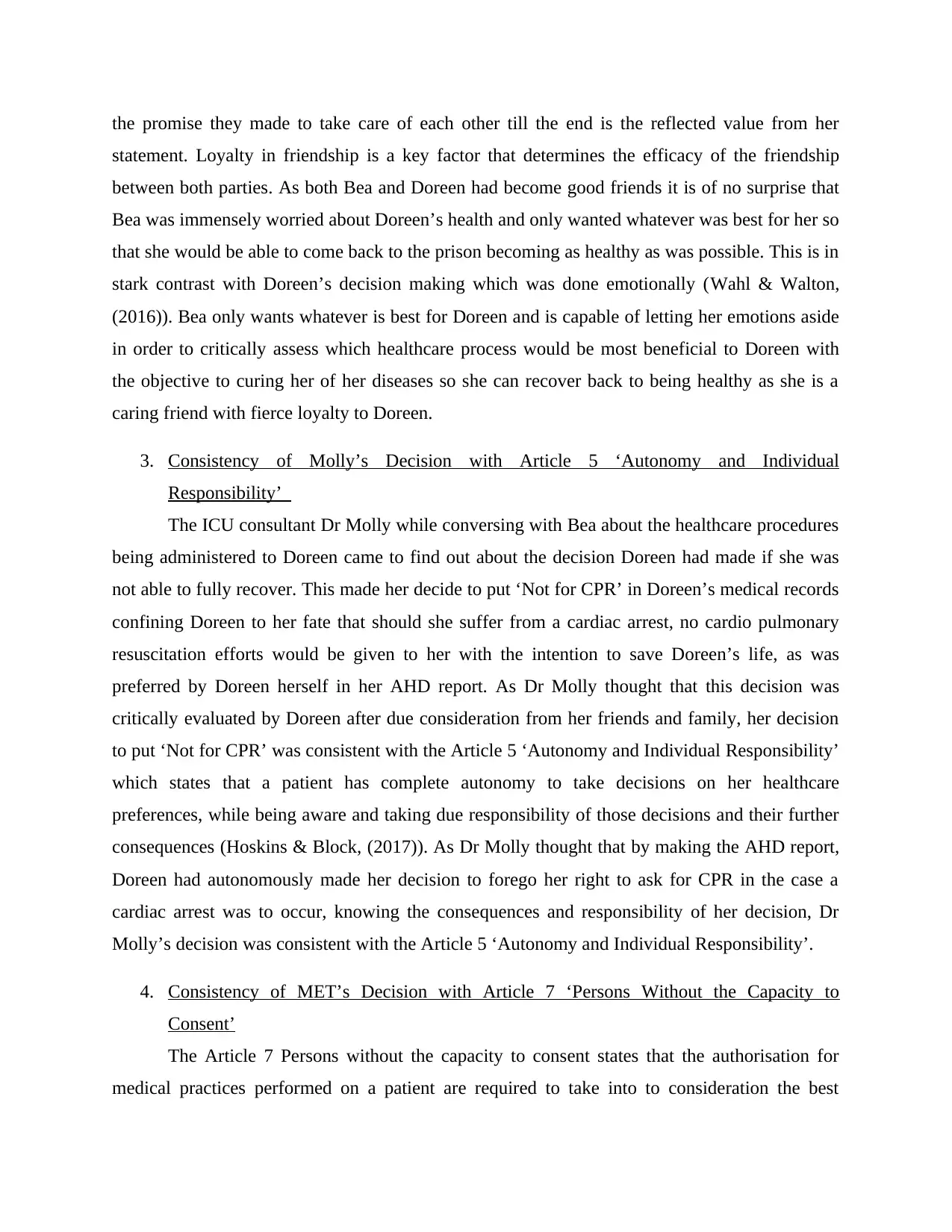
the promise they made to take care of each other till the end is the reflected value from her
statement. Loyalty in friendship is a key factor that determines the efficacy of the friendship
between both parties. As both Bea and Doreen had become good friends it is of no surprise that
Bea was immensely worried about Doreen’s health and only wanted whatever was best for her so
that she would be able to come back to the prison becoming as healthy as was possible. This is in
stark contrast with Doreen’s decision making which was done emotionally (Wahl & Walton,
(2016)). Bea only wants whatever is best for Doreen and is capable of letting her emotions aside
in order to critically assess which healthcare process would be most beneficial to Doreen with
the objective to curing her of her diseases so she can recover back to being healthy as she is a
caring friend with fierce loyalty to Doreen.
3. Consistency of Molly’s Decision with Article 5 ‘Autonomy and Individual
Responsibility’
The ICU consultant Dr Molly while conversing with Bea about the healthcare procedures
being administered to Doreen came to find out about the decision Doreen had made if she was
not able to fully recover. This made her decide to put ‘Not for CPR’ in Doreen’s medical records
confining Doreen to her fate that should she suffer from a cardiac arrest, no cardio pulmonary
resuscitation efforts would be given to her with the intention to save Doreen’s life, as was
preferred by Doreen herself in her AHD report. As Dr Molly thought that this decision was
critically evaluated by Doreen after due consideration from her friends and family, her decision
to put ‘Not for CPR’ was consistent with the Article 5 ‘Autonomy and Individual Responsibility’
which states that a patient has complete autonomy to take decisions on her healthcare
preferences, while being aware and taking due responsibility of those decisions and their further
consequences (Hoskins & Block, (2017)). As Dr Molly thought that by making the AHD report,
Doreen had autonomously made her decision to forego her right to ask for CPR in the case a
cardiac arrest was to occur, knowing the consequences and responsibility of her decision, Dr
Molly’s decision was consistent with the Article 5 ‘Autonomy and Individual Responsibility’.
4. Consistency of MET’s Decision with Article 7 ‘Persons Without the Capacity to
Consent’
The Article 7 Persons without the capacity to consent states that the authorisation for
medical practices performed on a patient are required to take into to consideration the best
statement. Loyalty in friendship is a key factor that determines the efficacy of the friendship
between both parties. As both Bea and Doreen had become good friends it is of no surprise that
Bea was immensely worried about Doreen’s health and only wanted whatever was best for her so
that she would be able to come back to the prison becoming as healthy as was possible. This is in
stark contrast with Doreen’s decision making which was done emotionally (Wahl & Walton,
(2016)). Bea only wants whatever is best for Doreen and is capable of letting her emotions aside
in order to critically assess which healthcare process would be most beneficial to Doreen with
the objective to curing her of her diseases so she can recover back to being healthy as she is a
caring friend with fierce loyalty to Doreen.
3. Consistency of Molly’s Decision with Article 5 ‘Autonomy and Individual
Responsibility’
The ICU consultant Dr Molly while conversing with Bea about the healthcare procedures
being administered to Doreen came to find out about the decision Doreen had made if she was
not able to fully recover. This made her decide to put ‘Not for CPR’ in Doreen’s medical records
confining Doreen to her fate that should she suffer from a cardiac arrest, no cardio pulmonary
resuscitation efforts would be given to her with the intention to save Doreen’s life, as was
preferred by Doreen herself in her AHD report. As Dr Molly thought that this decision was
critically evaluated by Doreen after due consideration from her friends and family, her decision
to put ‘Not for CPR’ was consistent with the Article 5 ‘Autonomy and Individual Responsibility’
which states that a patient has complete autonomy to take decisions on her healthcare
preferences, while being aware and taking due responsibility of those decisions and their further
consequences (Hoskins & Block, (2017)). As Dr Molly thought that by making the AHD report,
Doreen had autonomously made her decision to forego her right to ask for CPR in the case a
cardiac arrest was to occur, knowing the consequences and responsibility of her decision, Dr
Molly’s decision was consistent with the Article 5 ‘Autonomy and Individual Responsibility’.
4. Consistency of MET’s Decision with Article 7 ‘Persons Without the Capacity to
Consent’
The Article 7 Persons without the capacity to consent states that the authorisation for
medical practices performed on a patient are required to take into to consideration the best
Paraphrase This Document
Need a fresh take? Get an instant paraphrase of this document with our AI Paraphraser
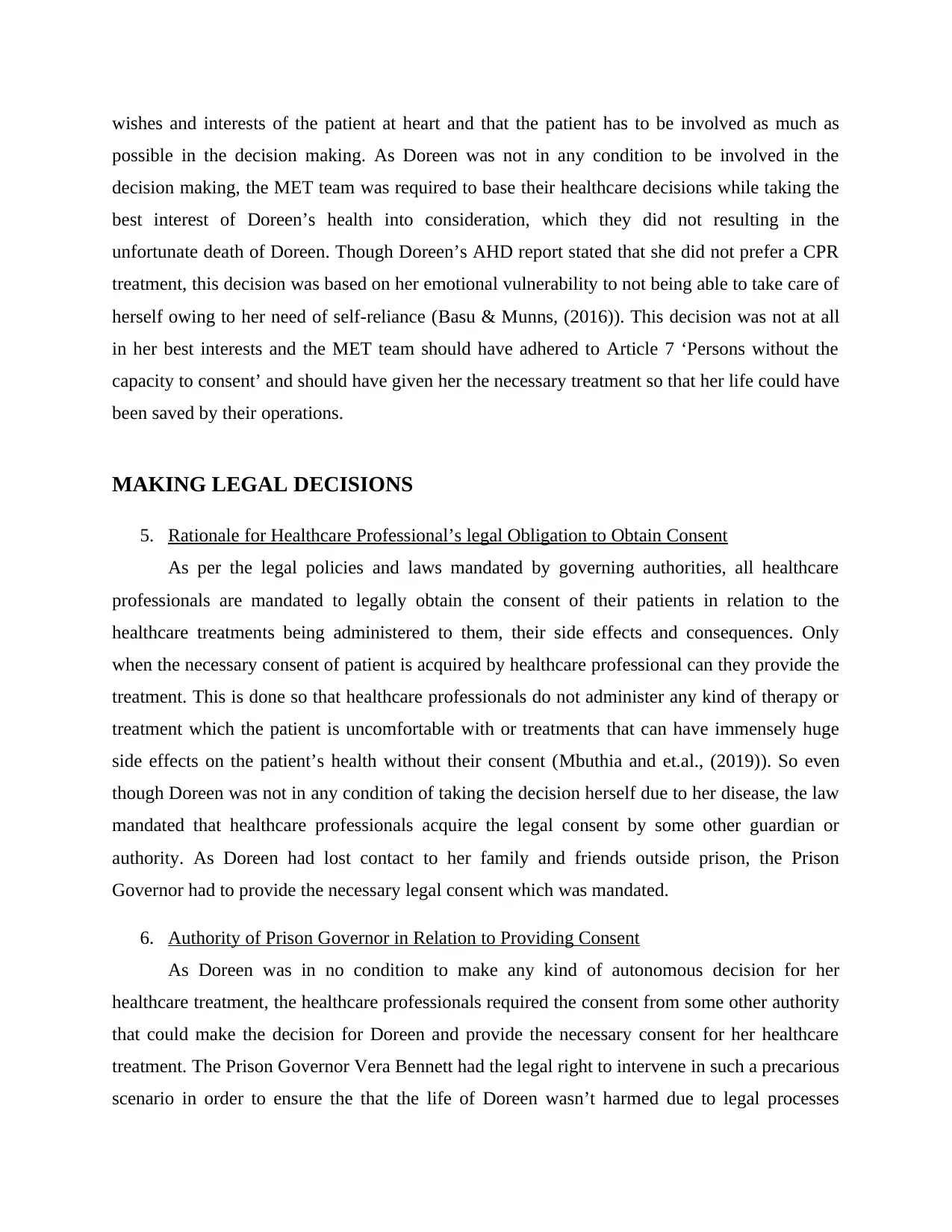
wishes and interests of the patient at heart and that the patient has to be involved as much as
possible in the decision making. As Doreen was not in any condition to be involved in the
decision making, the MET team was required to base their healthcare decisions while taking the
best interest of Doreen’s health into consideration, which they did not resulting in the
unfortunate death of Doreen. Though Doreen’s AHD report stated that she did not prefer a CPR
treatment, this decision was based on her emotional vulnerability to not being able to take care of
herself owing to her need of self-reliance (Basu & Munns, (2016)). This decision was not at all
in her best interests and the MET team should have adhered to Article 7 ‘Persons without the
capacity to consent’ and should have given her the necessary treatment so that her life could have
been saved by their operations.
MAKING LEGAL DECISIONS
5. Rationale for Healthcare Professional’s legal Obligation to Obtain Consent
As per the legal policies and laws mandated by governing authorities, all healthcare
professionals are mandated to legally obtain the consent of their patients in relation to the
healthcare treatments being administered to them, their side effects and consequences. Only
when the necessary consent of patient is acquired by healthcare professional can they provide the
treatment. This is done so that healthcare professionals do not administer any kind of therapy or
treatment which the patient is uncomfortable with or treatments that can have immensely huge
side effects on the patient’s health without their consent (Mbuthia and et.al., (2019)). So even
though Doreen was not in any condition of taking the decision herself due to her disease, the law
mandated that healthcare professionals acquire the legal consent by some other guardian or
authority. As Doreen had lost contact to her family and friends outside prison, the Prison
Governor had to provide the necessary legal consent which was mandated.
6. Authority of Prison Governor in Relation to Providing Consent
As Doreen was in no condition to make any kind of autonomous decision for her
healthcare treatment, the healthcare professionals required the consent from some other authority
that could make the decision for Doreen and provide the necessary consent for her healthcare
treatment. The Prison Governor Vera Bennett had the legal right to intervene in such a precarious
scenario in order to ensure the that the life of Doreen wasn’t harmed due to legal processes
possible in the decision making. As Doreen was not in any condition to be involved in the
decision making, the MET team was required to base their healthcare decisions while taking the
best interest of Doreen’s health into consideration, which they did not resulting in the
unfortunate death of Doreen. Though Doreen’s AHD report stated that she did not prefer a CPR
treatment, this decision was based on her emotional vulnerability to not being able to take care of
herself owing to her need of self-reliance (Basu & Munns, (2016)). This decision was not at all
in her best interests and the MET team should have adhered to Article 7 ‘Persons without the
capacity to consent’ and should have given her the necessary treatment so that her life could have
been saved by their operations.
MAKING LEGAL DECISIONS
5. Rationale for Healthcare Professional’s legal Obligation to Obtain Consent
As per the legal policies and laws mandated by governing authorities, all healthcare
professionals are mandated to legally obtain the consent of their patients in relation to the
healthcare treatments being administered to them, their side effects and consequences. Only
when the necessary consent of patient is acquired by healthcare professional can they provide the
treatment. This is done so that healthcare professionals do not administer any kind of therapy or
treatment which the patient is uncomfortable with or treatments that can have immensely huge
side effects on the patient’s health without their consent (Mbuthia and et.al., (2019)). So even
though Doreen was not in any condition of taking the decision herself due to her disease, the law
mandated that healthcare professionals acquire the legal consent by some other guardian or
authority. As Doreen had lost contact to her family and friends outside prison, the Prison
Governor had to provide the necessary legal consent which was mandated.
6. Authority of Prison Governor in Relation to Providing Consent
As Doreen was in no condition to make any kind of autonomous decision for her
healthcare treatment, the healthcare professionals required the consent from some other authority
that could make the decision for Doreen and provide the necessary consent for her healthcare
treatment. The Prison Governor Vera Bennett had the legal right to intervene in such a precarious
scenario in order to ensure the that the life of Doreen wasn’t harmed due to legal processes
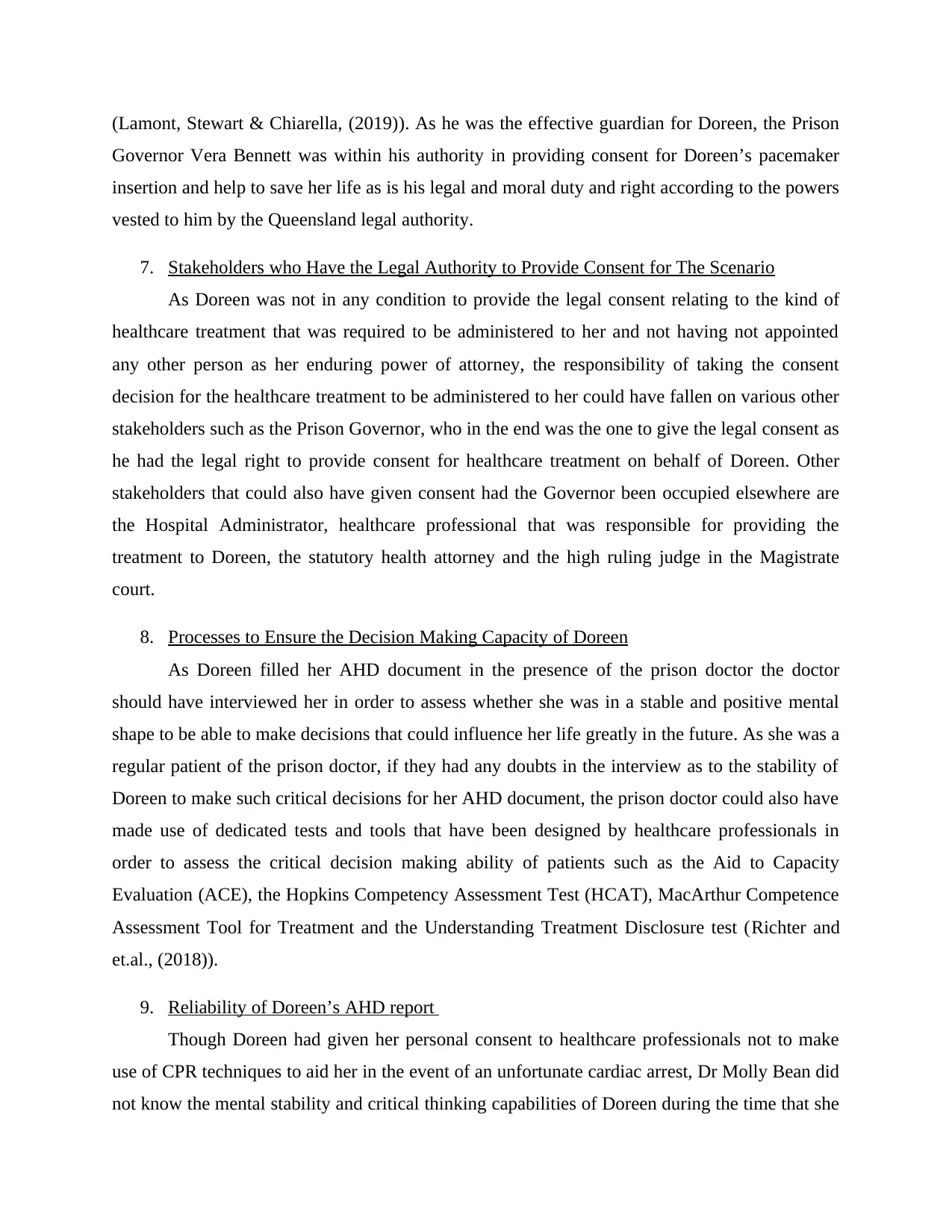
(Lamont, Stewart & Chiarella, (2019)). As he was the effective guardian for Doreen, the Prison
Governor Vera Bennett was within his authority in providing consent for Doreen’s pacemaker
insertion and help to save her life as is his legal and moral duty and right according to the powers
vested to him by the Queensland legal authority.
7. Stakeholders who Have the Legal Authority to Provide Consent for The Scenario
As Doreen was not in any condition to provide the legal consent relating to the kind of
healthcare treatment that was required to be administered to her and not having not appointed
any other person as her enduring power of attorney, the responsibility of taking the consent
decision for the healthcare treatment to be administered to her could have fallen on various other
stakeholders such as the Prison Governor, who in the end was the one to give the legal consent as
he had the legal right to provide consent for healthcare treatment on behalf of Doreen. Other
stakeholders that could also have given consent had the Governor been occupied elsewhere are
the Hospital Administrator, healthcare professional that was responsible for providing the
treatment to Doreen, the statutory health attorney and the high ruling judge in the Magistrate
court.
8. Processes to Ensure the Decision Making Capacity of Doreen
As Doreen filled her AHD document in the presence of the prison doctor the doctor
should have interviewed her in order to assess whether she was in a stable and positive mental
shape to be able to make decisions that could influence her life greatly in the future. As she was a
regular patient of the prison doctor, if they had any doubts in the interview as to the stability of
Doreen to make such critical decisions for her AHD document, the prison doctor could also have
made use of dedicated tests and tools that have been designed by healthcare professionals in
order to assess the critical decision making ability of patients such as the Aid to Capacity
Evaluation (ACE), the Hopkins Competency Assessment Test (HCAT), MacArthur Competence
Assessment Tool for Treatment and the Understanding Treatment Disclosure test (Richter and
et.al., (2018)).
9. Reliability of Doreen’s AHD report
Though Doreen had given her personal consent to healthcare professionals not to make
use of CPR techniques to aid her in the event of an unfortunate cardiac arrest, Dr Molly Bean did
not know the mental stability and critical thinking capabilities of Doreen during the time that she
Governor Vera Bennett was within his authority in providing consent for Doreen’s pacemaker
insertion and help to save her life as is his legal and moral duty and right according to the powers
vested to him by the Queensland legal authority.
7. Stakeholders who Have the Legal Authority to Provide Consent for The Scenario
As Doreen was not in any condition to provide the legal consent relating to the kind of
healthcare treatment that was required to be administered to her and not having not appointed
any other person as her enduring power of attorney, the responsibility of taking the consent
decision for the healthcare treatment to be administered to her could have fallen on various other
stakeholders such as the Prison Governor, who in the end was the one to give the legal consent as
he had the legal right to provide consent for healthcare treatment on behalf of Doreen. Other
stakeholders that could also have given consent had the Governor been occupied elsewhere are
the Hospital Administrator, healthcare professional that was responsible for providing the
treatment to Doreen, the statutory health attorney and the high ruling judge in the Magistrate
court.
8. Processes to Ensure the Decision Making Capacity of Doreen
As Doreen filled her AHD document in the presence of the prison doctor the doctor
should have interviewed her in order to assess whether she was in a stable and positive mental
shape to be able to make decisions that could influence her life greatly in the future. As she was a
regular patient of the prison doctor, if they had any doubts in the interview as to the stability of
Doreen to make such critical decisions for her AHD document, the prison doctor could also have
made use of dedicated tests and tools that have been designed by healthcare professionals in
order to assess the critical decision making ability of patients such as the Aid to Capacity
Evaluation (ACE), the Hopkins Competency Assessment Test (HCAT), MacArthur Competence
Assessment Tool for Treatment and the Understanding Treatment Disclosure test (Richter and
et.al., (2018)).
9. Reliability of Doreen’s AHD report
Though Doreen had given her personal consent to healthcare professionals not to make
use of CPR techniques to aid her in the event of an unfortunate cardiac arrest, Dr Molly Bean did
not know the mental stability and critical thinking capabilities of Doreen during the time that she
⊘ This is a preview!⊘
Do you want full access?
Subscribe today to unlock all pages.

Trusted by 1+ million students worldwide
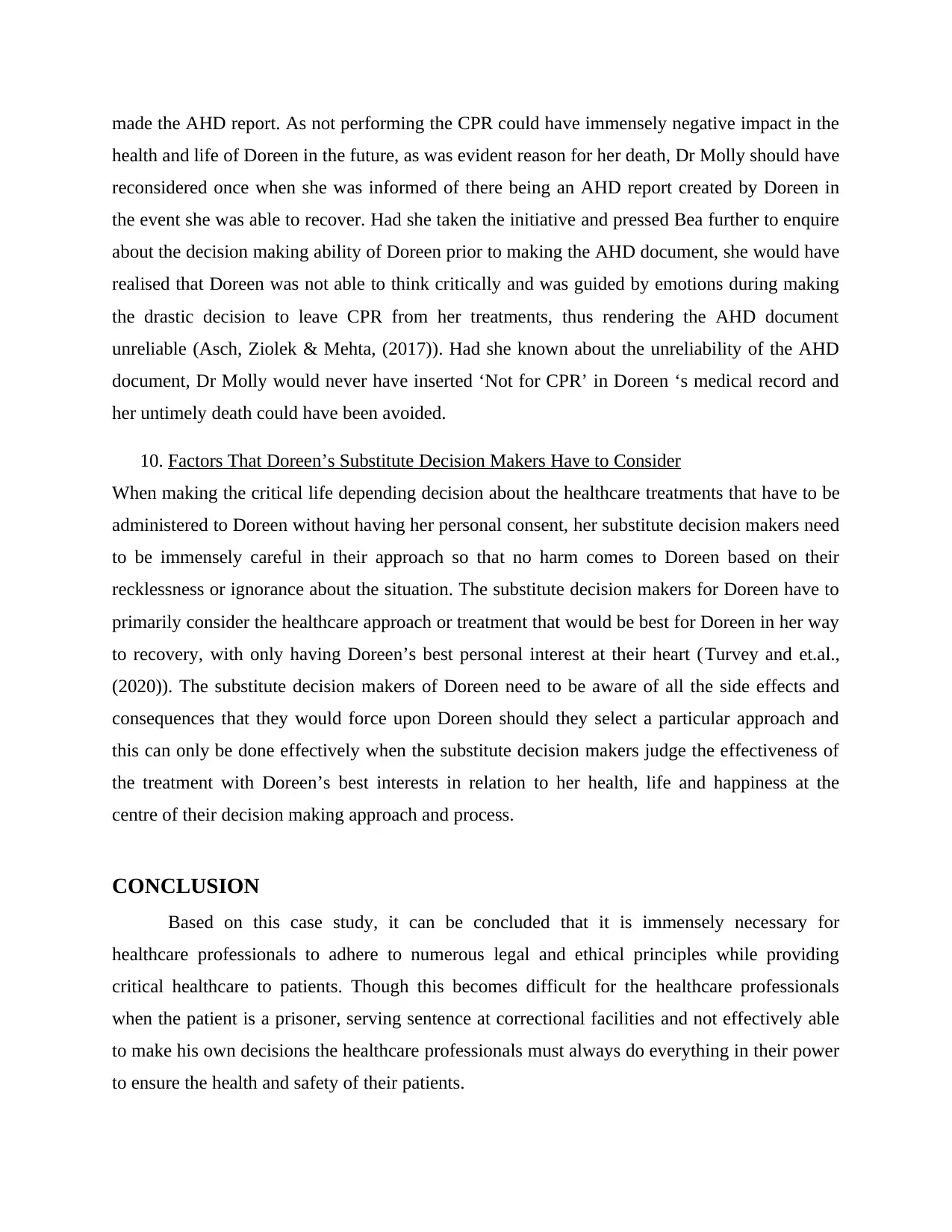
made the AHD report. As not performing the CPR could have immensely negative impact in the
health and life of Doreen in the future, as was evident reason for her death, Dr Molly should have
reconsidered once when she was informed of there being an AHD report created by Doreen in
the event she was able to recover. Had she taken the initiative and pressed Bea further to enquire
about the decision making ability of Doreen prior to making the AHD document, she would have
realised that Doreen was not able to think critically and was guided by emotions during making
the drastic decision to leave CPR from her treatments, thus rendering the AHD document
unreliable (Asch, Ziolek & Mehta, (2017)). Had she known about the unreliability of the AHD
document, Dr Molly would never have inserted ‘Not for CPR’ in Doreen ‘s medical record and
her untimely death could have been avoided.
10. Factors That Doreen’s Substitute Decision Makers Have to Consider
When making the critical life depending decision about the healthcare treatments that have to be
administered to Doreen without having her personal consent, her substitute decision makers need
to be immensely careful in their approach so that no harm comes to Doreen based on their
recklessness or ignorance about the situation. The substitute decision makers for Doreen have to
primarily consider the healthcare approach or treatment that would be best for Doreen in her way
to recovery, with only having Doreen’s best personal interest at their heart (Turvey and et.al.,
(2020)). The substitute decision makers of Doreen need to be aware of all the side effects and
consequences that they would force upon Doreen should they select a particular approach and
this can only be done effectively when the substitute decision makers judge the effectiveness of
the treatment with Doreen’s best interests in relation to her health, life and happiness at the
centre of their decision making approach and process.
CONCLUSION
Based on this case study, it can be concluded that it is immensely necessary for
healthcare professionals to adhere to numerous legal and ethical principles while providing
critical healthcare to patients. Though this becomes difficult for the healthcare professionals
when the patient is a prisoner, serving sentence at correctional facilities and not effectively able
to make his own decisions the healthcare professionals must always do everything in their power
to ensure the health and safety of their patients.
health and life of Doreen in the future, as was evident reason for her death, Dr Molly should have
reconsidered once when she was informed of there being an AHD report created by Doreen in
the event she was able to recover. Had she taken the initiative and pressed Bea further to enquire
about the decision making ability of Doreen prior to making the AHD document, she would have
realised that Doreen was not able to think critically and was guided by emotions during making
the drastic decision to leave CPR from her treatments, thus rendering the AHD document
unreliable (Asch, Ziolek & Mehta, (2017)). Had she known about the unreliability of the AHD
document, Dr Molly would never have inserted ‘Not for CPR’ in Doreen ‘s medical record and
her untimely death could have been avoided.
10. Factors That Doreen’s Substitute Decision Makers Have to Consider
When making the critical life depending decision about the healthcare treatments that have to be
administered to Doreen without having her personal consent, her substitute decision makers need
to be immensely careful in their approach so that no harm comes to Doreen based on their
recklessness or ignorance about the situation. The substitute decision makers for Doreen have to
primarily consider the healthcare approach or treatment that would be best for Doreen in her way
to recovery, with only having Doreen’s best personal interest at their heart (Turvey and et.al.,
(2020)). The substitute decision makers of Doreen need to be aware of all the side effects and
consequences that they would force upon Doreen should they select a particular approach and
this can only be done effectively when the substitute decision makers judge the effectiveness of
the treatment with Doreen’s best interests in relation to her health, life and happiness at the
centre of their decision making approach and process.
CONCLUSION
Based on this case study, it can be concluded that it is immensely necessary for
healthcare professionals to adhere to numerous legal and ethical principles while providing
critical healthcare to patients. Though this becomes difficult for the healthcare professionals
when the patient is a prisoner, serving sentence at correctional facilities and not effectively able
to make his own decisions the healthcare professionals must always do everything in their power
to ensure the health and safety of their patients.
Paraphrase This Document
Need a fresh take? Get an instant paraphrase of this document with our AI Paraphraser

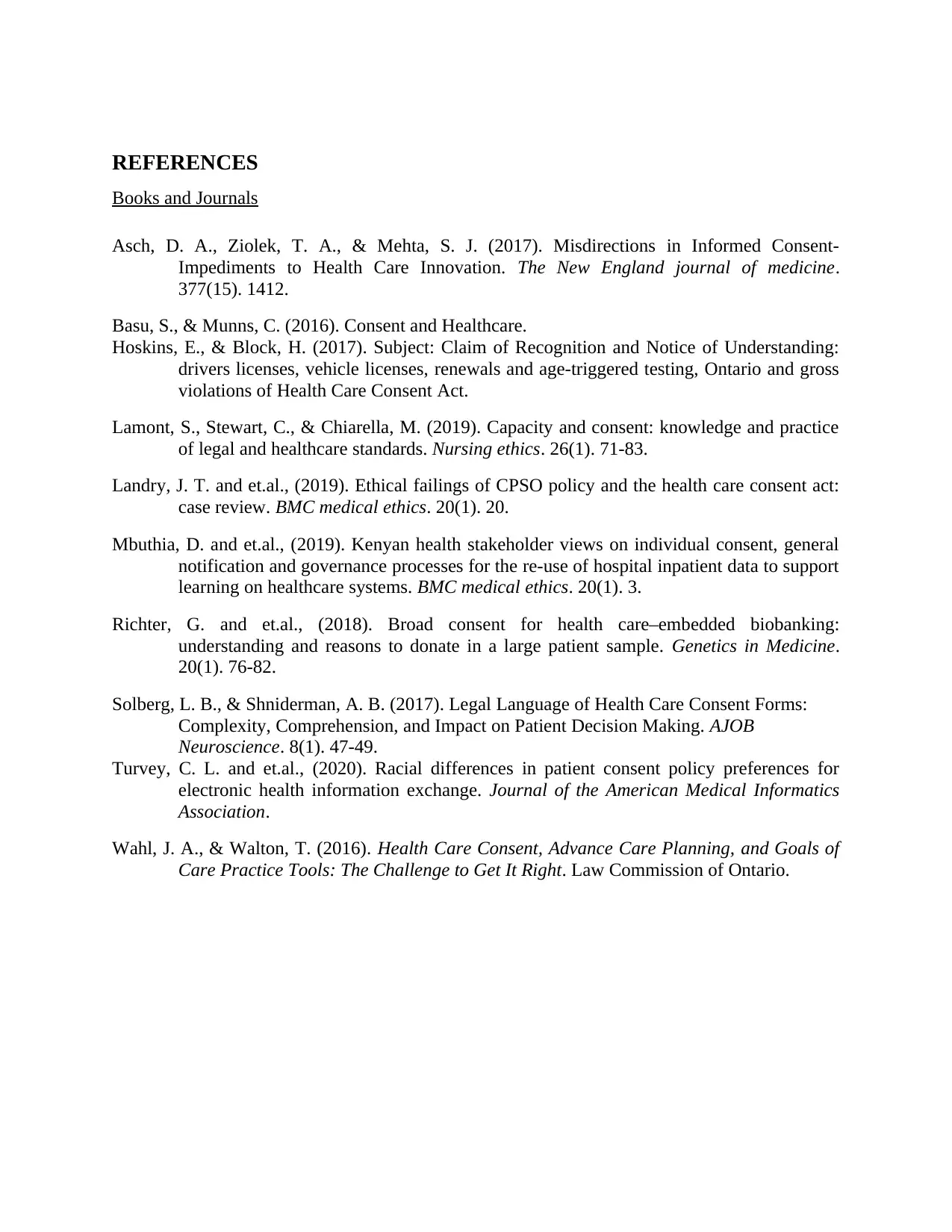
REFERENCES
Books and Journals
Asch, D. A., Ziolek, T. A., & Mehta, S. J. (2017). Misdirections in Informed Consent-
Impediments to Health Care Innovation. The New England journal of medicine.
377(15). 1412.
Basu, S., & Munns, C. (2016). Consent and Healthcare.
Hoskins, E., & Block, H. (2017). Subject: Claim of Recognition and Notice of Understanding:
drivers licenses, vehicle licenses, renewals and age-triggered testing, Ontario and gross
violations of Health Care Consent Act.
Lamont, S., Stewart, C., & Chiarella, M. (2019). Capacity and consent: knowledge and practice
of legal and healthcare standards. Nursing ethics. 26(1). 71-83.
Landry, J. T. and et.al., (2019). Ethical failings of CPSO policy and the health care consent act:
case review. BMC medical ethics. 20(1). 20.
Mbuthia, D. and et.al., (2019). Kenyan health stakeholder views on individual consent, general
notification and governance processes for the re-use of hospital inpatient data to support
learning on healthcare systems. BMC medical ethics. 20(1). 3.
Richter, G. and et.al., (2018). Broad consent for health care–embedded biobanking:
understanding and reasons to donate in a large patient sample. Genetics in Medicine.
20(1). 76-82.
Solberg, L. B., & Shniderman, A. B. (2017). Legal Language of Health Care Consent Forms:
Complexity, Comprehension, and Impact on Patient Decision Making. AJOB
Neuroscience. 8(1). 47-49.
Turvey, C. L. and et.al., (2020). Racial differences in patient consent policy preferences for
electronic health information exchange. Journal of the American Medical Informatics
Association.
Wahl, J. A., & Walton, T. (2016). Health Care Consent, Advance Care Planning, and Goals of
Care Practice Tools: The Challenge to Get It Right. Law Commission of Ontario.
Books and Journals
Asch, D. A., Ziolek, T. A., & Mehta, S. J. (2017). Misdirections in Informed Consent-
Impediments to Health Care Innovation. The New England journal of medicine.
377(15). 1412.
Basu, S., & Munns, C. (2016). Consent and Healthcare.
Hoskins, E., & Block, H. (2017). Subject: Claim of Recognition and Notice of Understanding:
drivers licenses, vehicle licenses, renewals and age-triggered testing, Ontario and gross
violations of Health Care Consent Act.
Lamont, S., Stewart, C., & Chiarella, M. (2019). Capacity and consent: knowledge and practice
of legal and healthcare standards. Nursing ethics. 26(1). 71-83.
Landry, J. T. and et.al., (2019). Ethical failings of CPSO policy and the health care consent act:
case review. BMC medical ethics. 20(1). 20.
Mbuthia, D. and et.al., (2019). Kenyan health stakeholder views on individual consent, general
notification and governance processes for the re-use of hospital inpatient data to support
learning on healthcare systems. BMC medical ethics. 20(1). 3.
Richter, G. and et.al., (2018). Broad consent for health care–embedded biobanking:
understanding and reasons to donate in a large patient sample. Genetics in Medicine.
20(1). 76-82.
Solberg, L. B., & Shniderman, A. B. (2017). Legal Language of Health Care Consent Forms:
Complexity, Comprehension, and Impact on Patient Decision Making. AJOB
Neuroscience. 8(1). 47-49.
Turvey, C. L. and et.al., (2020). Racial differences in patient consent policy preferences for
electronic health information exchange. Journal of the American Medical Informatics
Association.
Wahl, J. A., & Walton, T. (2016). Health Care Consent, Advance Care Planning, and Goals of
Care Practice Tools: The Challenge to Get It Right. Law Commission of Ontario.
⊘ This is a preview!⊘
Do you want full access?
Subscribe today to unlock all pages.

Trusted by 1+ million students worldwide

1 out of 10
Related Documents
Your All-in-One AI-Powered Toolkit for Academic Success.
+13062052269
info@desklib.com
Available 24*7 on WhatsApp / Email
![[object Object]](/_next/static/media/star-bottom.7253800d.svg)
Unlock your academic potential
Copyright © 2020–2026 A2Z Services. All Rights Reserved. Developed and managed by ZUCOL.





